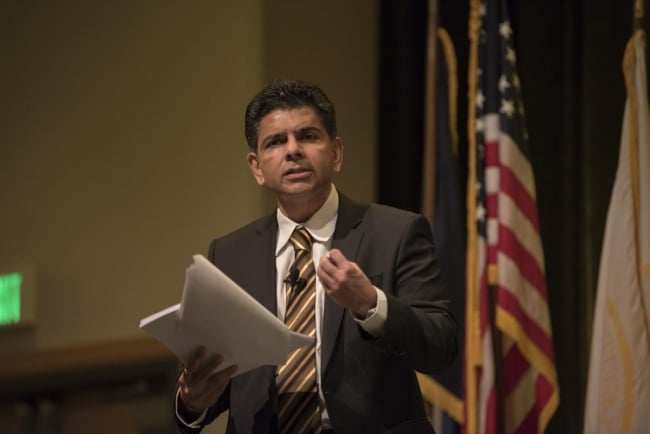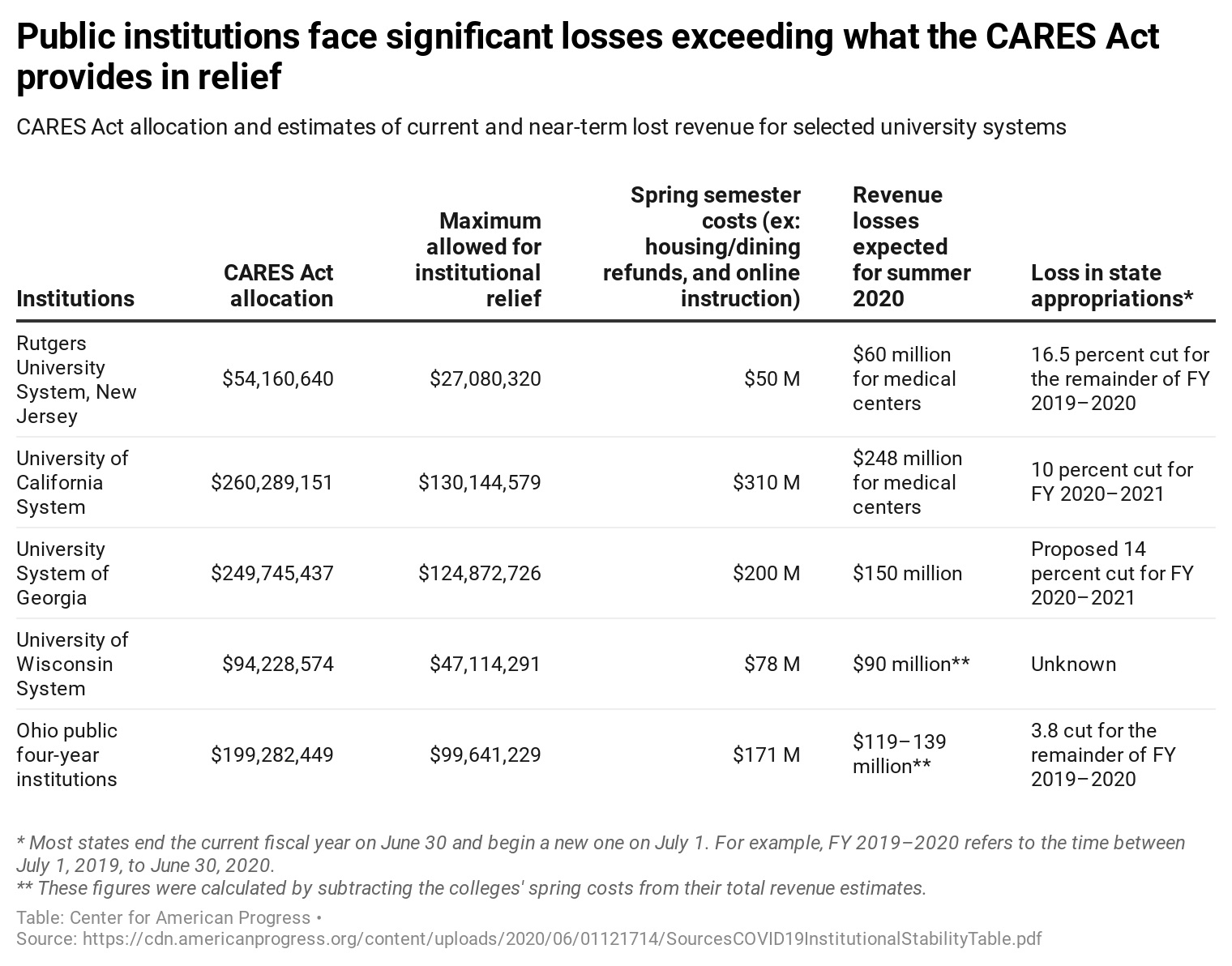You have /5 articles left.
Sign up for a free account or log in.

Ashish Vaidya, Northern Kentucky University's president
Scott Beseler, NKU
Ever since the coronavirus shuttered campuses, creating costs, among other things, for refunding room and board for empty residence halls and uneaten meals, colleges and universities have been crying for federal help.
As their financial situation has gotten worse, university leaders have been making the case to top Republican senators and their aides that more federal help is needed. For example, James Milliken, chancellor of the University of Texas system, in conversations with the state's congressional delegation has been pointing out that precautions taken before reopening campuses, like reconfiguring classrooms to protect against the pandemic, are costing the system millions of dollars.
Adding to the urgency is that time is apparently running out for getting help from Congress.
Negotiations in Congress over its next coronavirus relief package, which likely would come after the July 4 holiday, could be “the last bite at the apple,” as Jon Fansmith, the American Council on Education’s government relations director, put it in an interview.
Whether Congress agrees to pass another package at all is uncertain. House Democrats and Senate Republicans face a $2 trillion gulf over how large it should be. And Senate Republicans are insisting, over Democrats' objections, that any new bill include liability protections for businesses and colleges from coronavirus-related lawsuits.
If there is another stimulus, it will be the last, Senate Majority Leader Mitch McConnell told reporters in his home state of Kentucky recently. Uneasy about adding to the $3 trillion Congress has already spent on coronavirus relief, McConnell referred to the next package as “a fourth and final bill.”
According to multiple reports, McConnell wants a final package to be less than $1 trillion, or half as much as the CARES Act. That included $14 billion for higher ed, or less than a third of the $46.6 billion colleges and universities say they need in a final relief package to cover even a percentage of the financial hit they’re taking during the pandemic.
Recent calls Ashish Vaidya, Northern Kentucky University's president, had with McConnell and Senator Lamar Alexander had with reporters also signal that colleges face big obstacles in getting the billions they want.
McConnell, according to Vaidya, said he wants funding in the next stimulus to be for things that would help the economy rebound.
“If we decide to do anything, it has to be tied to jobs,” Vaidya said he recalled McConnell saying.
In a view that he still holds, Alexander, chairman of the Senate education committee and former president of the University of Tennessee, told reporters three weeks ago that given limited funds, additional testing for coronavirus and the development of a vaccine are higher priorities than giving more money to states or colleges.
Covering Huge Losses
Meanwhile, negotiations over what to include in a last package are expected to include a number of policies pushed by education groups, including several that were included in the Democratic House majority's proposal for the next stimulus, dubbed the HEROES Act.
Groups including the centrist Third Way, in contrast to the position held by U.S. Education Secretary Betsy DeVos that undocumented students and others should be ineligible for emergency aid grants in the CARES Act, say colleges should be able to decide who gets the grants. The HEROES Act would give that discretion to colleges.
Concerned the recession will lead some for-profit colleges to make deceptive claims in aggressively recruiting students, as occurred in some cases in the wake of the last recession, Third Way, New America and the Institute for College Access & Success are opposing any higher education relief funds for the for-profit sector. But for-profits are planning to lobby hard against any prohibition, saying their colleges and students are being hurt by the pandemic as well.
Groups pushing for widespread student loan forgiveness will try again, although their prospects were hurt when House Democrats at the last minute limited their debt cancellation proposal to those with the most need.
In interviews, lobbyists for colleges as well as university presidents who have spoken with key senators said they are emphasizing the role higher education plays in bringing about what McConnell wants: an economic recovery.
Vaidya said McConnell has visited the Northern Kentucky University campus near Cincinnati several times and reached out to see how the institution is faring during the pandemic.
“I’m glad you said that,” Vaidya said he answered in response to McConnell linking funding to job creation. Vaidya, an economist, noted that university programs like its small business development center are essential to reversing projections that northern Kentucky could lose 10,000 jobs during the recession.
“We’re a driver and facilitator of economic prosperity,” Vaidya said. “If the priority is helping our economy get back on track and protecting the vulnerable, we play a very important role.”
As did Vaidya, Milliken said he has raised concerns about students having to drop out of college if they or their families lose jobs during the economic fallout of the pandemic. He has been talking with the staff of Texas’s delegation, which includes Senator John Cornyn, a top congressional Republican.
“We’re very concerned that if we don’t continue to offer our programs and do everything we can to continue enrollment, many more students will not persist and not get a degree,” he said.
“We need to think about the long term,” Milliken said. “Keeping on the track this generation of learners is going to be incredibly important to the strength of the economy in the long term.”
In declaring the next stimulus to be the last, Republican leaders may be hoping for a "V-shaped" economic recovery, as states and cities, including New York City, tentatively begin reopening, said Fansmith.
He and other higher education lobbyists, however, are arguing that even as businesses reopen, colleges will still be in financial trouble. The industry already has lost tens of billions of dollars, and colleges are having to shell out more to reopen, a priority for Alexander and the Trump administration.
Mitch Daniels, Purdue University's president, told Alexander’s committee that Purdue has had to buy a mile of Plexiglas to serve as barriers between faculty members and students in classrooms, though a university spokesman said Daniels, the former Republican governor of Indiana, has no position on additional federal funding for higher education.
But in a joint letter to congressional leaders, the American Council on Education and others representing two- and four-year colleges and universities said that just in the second half of this school year, colleges and universities “lost billions of dollars beyond the $14 billion appropriation for students and institutions in the CARES Act.”
Even the $46.6 billion they’re seeking “is far lower than the actual impact will be” to cover need-based financial aid for students whose families have been hurt financially by the epidemic or the loss of tuition from declining enrollment, said the letter signed by Ted Mitchell, ACE's president.
The progressive Center for American Progress said in a report released Thursday that the combined impact of the pandemic and state funding cuts on public colleges far outstrips funding in the CARES Act. It noted that Rutgers University faces $183 million in losses from issuing refunds, canceled procedures at its medical centers and state cuts, but it is receiving only $27 million from the stimulus package.

The Texas system's eight academic institutions have already taken a $120 million hit from the pandemic, Milliken said he’s told the congressional aides. And the system is facing a 5 percent cut in state funding this year, and again next year, while facing “all kinds of other expenditures, beyond masks and renovations,” to reopen, including signage, equipment related to testing requirements and setting aside space for people who are at risk.
The chances that higher education gets the entire $46.6 billion took a blow last month when the Democratic House, even in a $3 trillion relief package that Senate Republicans mocked as a liberal wish list, proposed only giving states $27 billion for higher education. The HEROES Act also proposed another $10.5 billion go directly to institutions, including $1.7 billion for historically black colleges and universities and others serving minorities and Native American tribes.
Fansmith said he’s hoping the idea that the next package will be Congress’s last chance to fund higher education could help.
“It really changes the dynamics,” Fansmith said. “Senators know how hard their colleges have been hit. So if this is going to be the last bite of the apple, then it better be a very big bite.”
But Alexander, who will influence higher education funding as chairman of the Senate’s Health, Education, Labor & Pensions committee, seemed to throw some cold water on that hope.
Whether colleges and states will get additional funding is an “open question,” Alexander said during the press call. Throwing more money to colleges or states is “not going to end the crisis,” he said. Rather, he said, “what's going to end the crisis” is the creation of a coronavirus vaccine and increasing the availability of testing.
“That's where our money and focus should go,” Alexander said.




